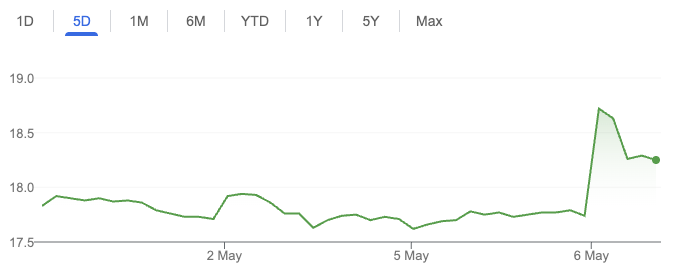In a market that often yawns at big announcements, Yes Bank decided to stir things up with a proper plot twist. Just when investors were getting used to slow moves and muted charts, news broke that Japan’s Sumitomo Mitsui Banking Corporation (SMBC) may acquire a 51% stake in Yes Bank—and suddenly, Yes Bank share price was sprinting.

It wasn’t a subtle move either. The stock opened with a loud pop on Tuesday, rising more than 10% in early trade, touching a high of ₹19.44 from a previous close of ₹17.73. And the buzz is not just about the share price—it’s about what this deal could mean for one of India’s most controversial yet resilient private banks.
Let’s break it all down.
The Big News: SMBC Eyes Majority Control
According to a report by Mint, SMBC has secured RBI’s approval to become the majority stakeholder in Yes Bank. The proposed valuation? Around $1.7 billion, if the grapevine is to be believed.
Now, SMBC is not just some casual investor. It’s one of Japan’s top financial institutions, part of the Sumitomo Group, and a serious global banking player. Their entry into Yes Bank isn’t just a change of ownership—it’s the return of a formal promoter, a luxury Yes Bank has lacked since the Rana Kapoor exit fiasco in 2019.
Two Paths, One Destination
SMBC is reportedly weighing two routes:
- Buy <26% initially, then go for a merger via share swap
- Directly acquire up to 26%, followed by an open offer
Eventually, the Japanese giant plans to raise its holding to 51%, though RBI norms will cap its voting rights at 26%. It’s a classic “power without full control” setup—designed to protect the interests of existing stakeholders while allowing new blood to take over operations.
This approach reflects cautious optimism. SMBC doesn’t want to shake the boat—it wants to steer it differently.
Exit Route for Rescue Team
Back in 2020, Yes Bank was literally rescued from the brink. Under the watchful eyes of RBI, SBI and a consortium of Indian banks stepped in, took significant equity positions, and stabilized the bank.
But this was never meant to be a long-term marriage. It was more like a strategic babysitting job. Now, with SMBC entering the picture, the original rescuers—SBI, HDFC Bank, ICICI Bank, Axis Bank, and Kotak Mahindra Bank—finally have a clean exit route.
Currently, this group owns 33.74% of Yes Bank, with SBI holding the largest chunk at 23.99%. The exit, especially for SBI, couldn’t have come at a better time—share prices are on the rise, and the bank finally looks like it has a promoter with deep pockets and global vision.
Yes Bank Share Price: The Past, Present & Hopeful Future
Yes Bank’s stock has been on a roller coaster ride that could make even the most seasoned investor dizzy. Let’s take a quick look at its performance:
| Period | % Change in Share Price |
|---|---|
| Past 1 month | +9% |
| Year-to-date 2025 | –5% |
| Past 1 year | –22% |
| Past 5 years | –29% |
The 10% spike on the SMBC news was the first real breakout moment in months. It doesn’t just represent investor excitement—it signals the market’s confidence in a fundamental turnaround.
What This Means for Yes Bank’s Future
This deal is more than a stake sale. It brings:
- Capital infusion to strengthen the balance sheet
- Strategic leadership with global expertise
- A return of a formal promoter, ending years of uncertainty
- Better positioning to compete with big names like Axis and ICICI
And most importantly—it brings confidence.
Post-2020, Yes Bank has improved governance, reduced bad loans, and built capital buffers. But what it lacked was identity. SMBC’s entry could fill that gap. A promoter-backed, capital-strong Yes Bank is a very different animal from the one investors have known since the Rana Kapoor days.
Challenges Still Remain
Let’s not sugarcoat it. Yes Bank still has:
- Legacy bad loans
- A retail and SME book that needs scale
- Intense competition from digital-first NBFCs and banks
- A brand reputation that still needs rebuilding
SMBC can bring in fresh capital and credibility, but execution will be key. The integration must be smooth, regulatory hurdles need to be managed carefully, and retail depositors must stay confident throughout.
Should You Buy Yes Bank Shares Now?
If you’re looking for a quick trade, the recent pop may already have priced in a lot of the optimism. But for long-term investors willing to bet on a revival story backed by global capital, this may just be the inflection point.
Yes Bank is still trading at a relatively low valuation compared to peers, and if SMBC truly commits for the long haul, the upside could be significant. However, patience will be critical. This is not a sprint—this is a long game.
Final Thoughts: A New Chapter Begins
Yes Bank’s story has been dramatic—a meteoric rise, a brutal fall, a government-engineered rescue, and now, possibly, a global reboot. The Yes Bank share price surge is more than just market noise—it’s the market’s way of saying, “Maybe this time, things are different.”
Only time will tell how the SMBC chapter plays out. But one thing is clear: Yes Bank has gone from being India’s most talked-about rescue case to its newest turnaround story.
FAQs
1. Why did Yes Bank share price rise recently?
Because of reports that Japan’s SMBC may acquire a 51% stake in Yes Bank.
2. Who is SMBC?
Sumitomo Mitsui Banking Corporation, one of Japan’s largest and most respected financial institutions.
3. Is the RBI involved in this deal?
Yes, RBI has reportedly approved SMBC’s proposal to acquire a majority stake in Yes Bank.
4. Will SMBC become Yes Bank’s promoter?
Yes, if the deal goes through, SMBC will effectively become the bank’s new strategic promoter.
5. How much stake does SMBC plan to acquire?
Eventually up to 51%, though voting rights will be capped at 26% as per RBI norms.
6. What happens to SBI’s stake?
SBI and other bailout banks are expected to exit, selling their stakes to SMBC.
7. Is this good news for Yes Bank investors?
Yes, it indicates fresh capital, better leadership, and stronger future prospects.
8. What is the valuation of this deal?
The bank may be valued at around $1.7 billion, according to reports.
9. Can SMBC improve Yes Bank’s performance?
With its global expertise and capital, SMBC could significantly improve Yes Bank’s operations and trust factor.
10. Should I invest in Yes Bank now?
If you believe in long-term turnarounds and are okay with volatility, it could be a high-risk, high-reward bet.
Related Articles
Virtual Galaxy Infotech IPO: All You Need to Know Before Investing






